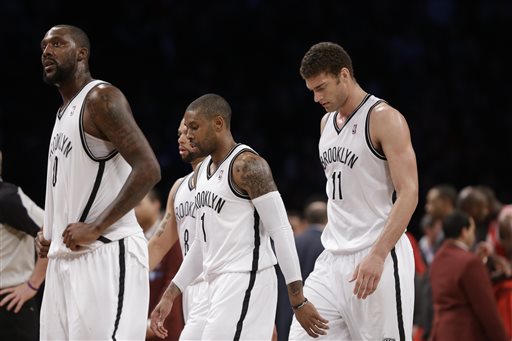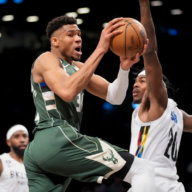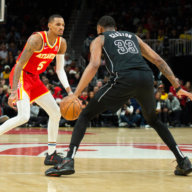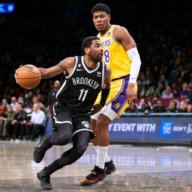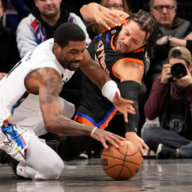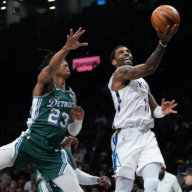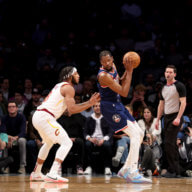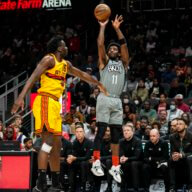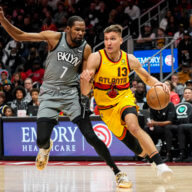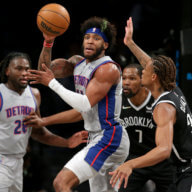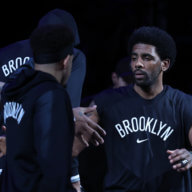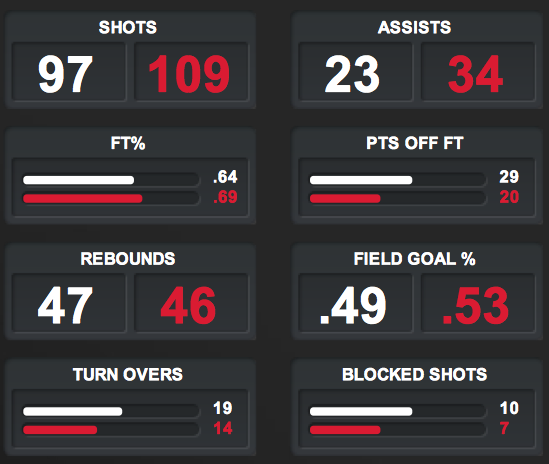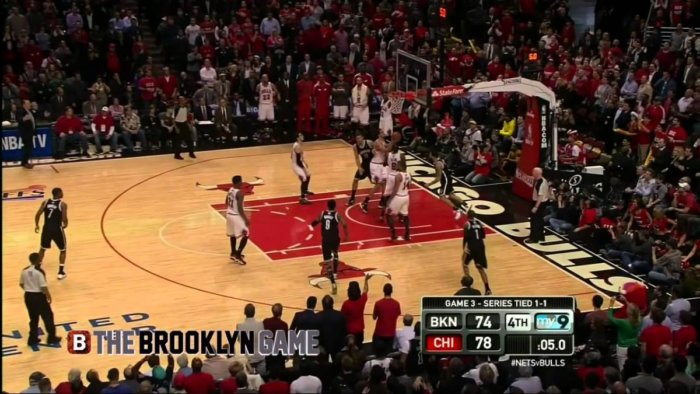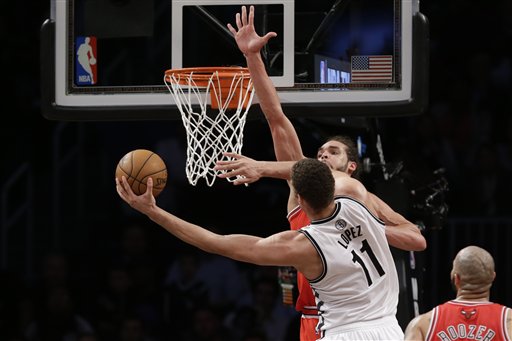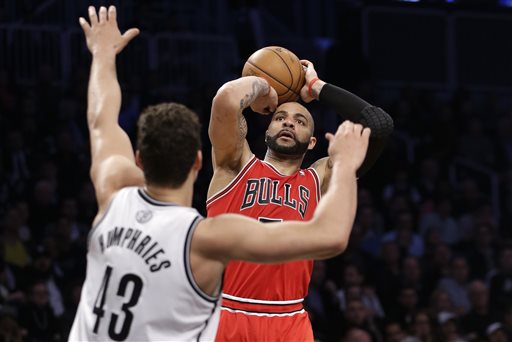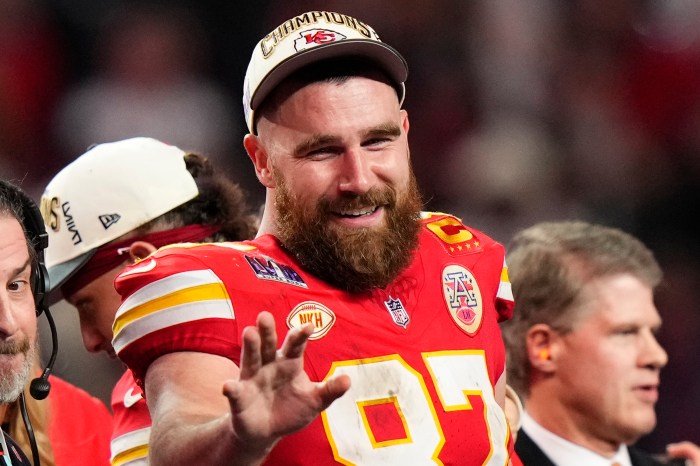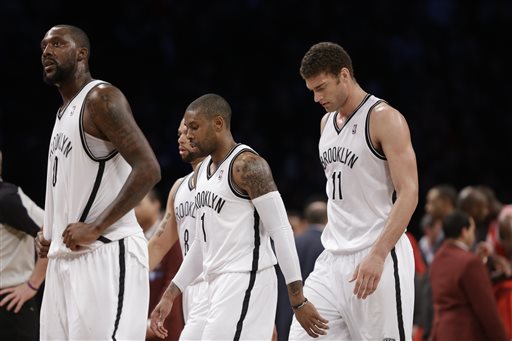
When the Brooklyn Nets signed Andray Blatche in September to a non-guaranteed deal, to say I went ballistic would be an understatement. I ranted for weeks. I wrote at length about how his talent was exclusively perception, and his combination of on- and off-court ineptitude made the deal little more than a worthless signing. I yelled at people. I fell so deep down the desperation rabbit hole a writer that I’d never spoken with in person messaged me to reassure me it was a non-guaranteed deal. This stuff actually happened. I was just livid as a human being that the Nets would give this waste of a basketball player a shot.
I say this because I need to make it abundantly clear: if you’d told me in September that I’d be advocating starting Andray Blatche in an elimination playoff game, I would’ve asked when Brook Lopez’s funeral was, and if mine was scheduled for the same day.
And yet, here we are. Because the way this series has progressed, and the season long mea culpa about his performance aside, there’s no doubt that Andray Blatche should play starter’s minutes minutes possible next to Brook Lopez in Game 6 against the Chicago Bulls Thursday night.
This isn’t always prudent. If the Nets play Blatche & Lopez next to each other for too long, there will be stretches when both have to rest, and the Nets are stuck running Reggie Evans & Kris Humphries at the 4 and 5 spots. (Ironically, having Nazr Mohammed — who the Nets pursued this summer before he spurned them for the opponent Chicago Bulls — would’ve been very useful for eating garbage minutes. Also: Jason Collins.) So if Lopez & Blatche each play, say, 35 minutes, they need to be staggered to some degree.
(As a note, I’m intentionally saying “starter’s minutes” rather than “start” as a general principle because it doesn’t matter so much who plays in the first 30 seconds as it does the full 48 minutes.)
To some degree, Nets interim head coach P.J. Carlesimo has done that. For all the criticism he gets for not playing the two in tandem, Carlesimo has gone with the Blatche-Lopez combo for 36 minutes this series, 16 of them in the fourth quarter — more than any other two-big combo in the fourth, and twice as many minutes as the starting tandem of Evans-Lopez. In these five games, Carlesimo has used the Blatche-Lopez combo in the fourth quarter for more than half as many minutes as he did in the entire regular season.
And it’s looked good:
Since Carlesimo took over as interim head coach of the Nets, he’s often talked about his desire to go “big,” specifically playing bigger players over smaller ones to utilize that advantage. The Nets’ best “big” advantage comes from their deadly offensive center combo of Brook Lopez and Andray Blatche, a combination that Carlesimo has seldom used in crunch time: the two have seen the court together in the fourth quarter just six times under Carlesimo, for an average of five fourth-quarter minutes a game. The Nets outscored opponents 68-51 in the 30 minutes those two shared the floor in regular season fourth quarters, a dominating performance in a small sample, leading him to use it more in the playoffs — and it’s delivered.
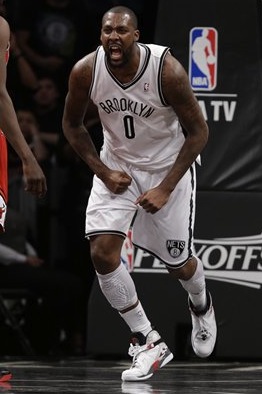
Blatche and Lopez is an intriguing combo for a variety of reasons: with Chicago’s frontline suffering from plantar fasciitis (Noah) and defensive ineptitude (Boozer), running out Blatche instead of Evans gives the Nets an enormous offensive upgrade. Additionally, Blatche merely functioning as an offensive threat the Bulls must respect puts him light-years ahead of Evans. Blatche’s offensive numbers speak for themselves: 19.5 points per 36 minutes, a 51.2% field goal percentage, a PER of 21.9, and an offensive rating of 107 — all career highs.
(Hey, remember when I said I’d rather the Nets take a chance on Eddy Curry than Andray Blatche? Me neither. So let’s just all live in the reality that says THAT NEVER HAPPENED. Cool.)
Watch this play again:
Great highlight? Yes. Big play in a playoff game? Sure. And without Andray Blatche on the floor, it never happens.
Watch again. Carlos Boozer is guarding Blatche, and since Blatche is a threat from outside of 17 feet, has to pick him up as soon as he reaches the foul line. Because of that, he’s not a threat to help down on Joe Johnson, even though Johnson is bunched right next to Boozer. With the non-threatening Evans on the floor, Boozer’s correct defensive position in this same play would be to sag off Evans, which would put him in perfect help position.
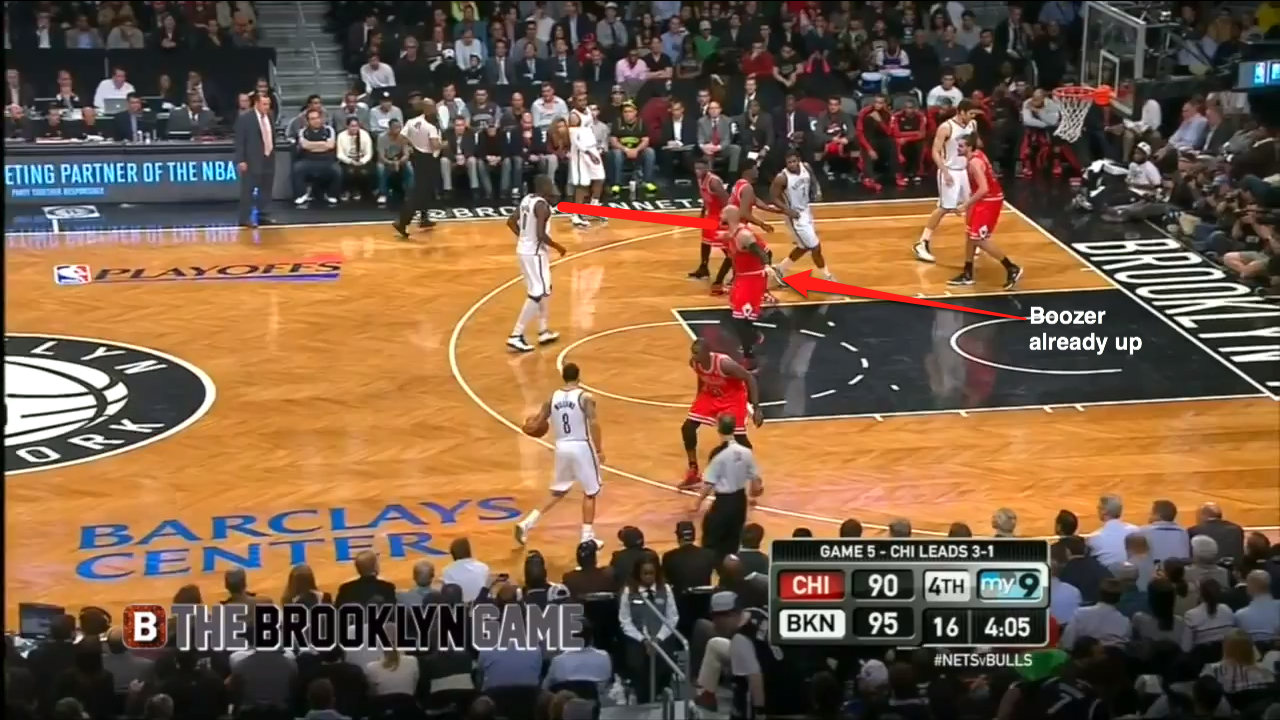
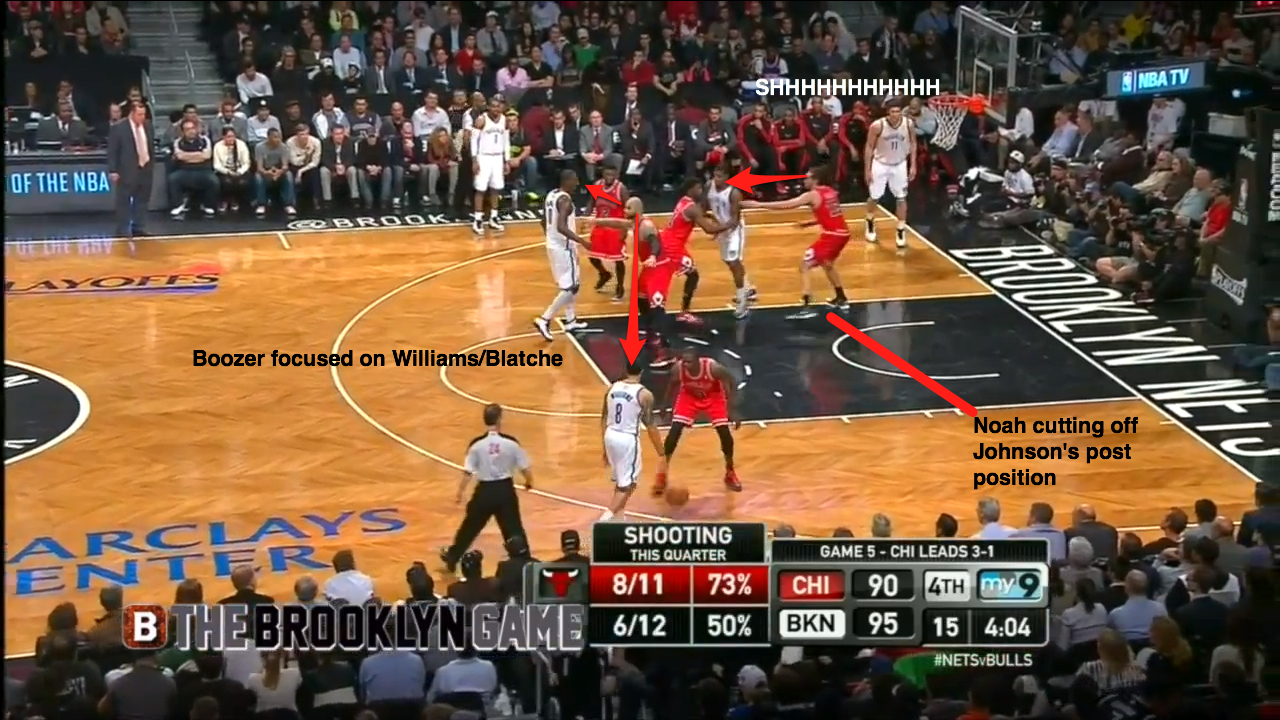
But with Blatche on the floor, it’s Noah’s instinct to help up, since Boozer has to stay attached to Blatche and a dish from Williams would give Johnson easy inside post position for a layup. And since Noah’s the one to help, that leaves Brook Lopez wide open for the dunk.
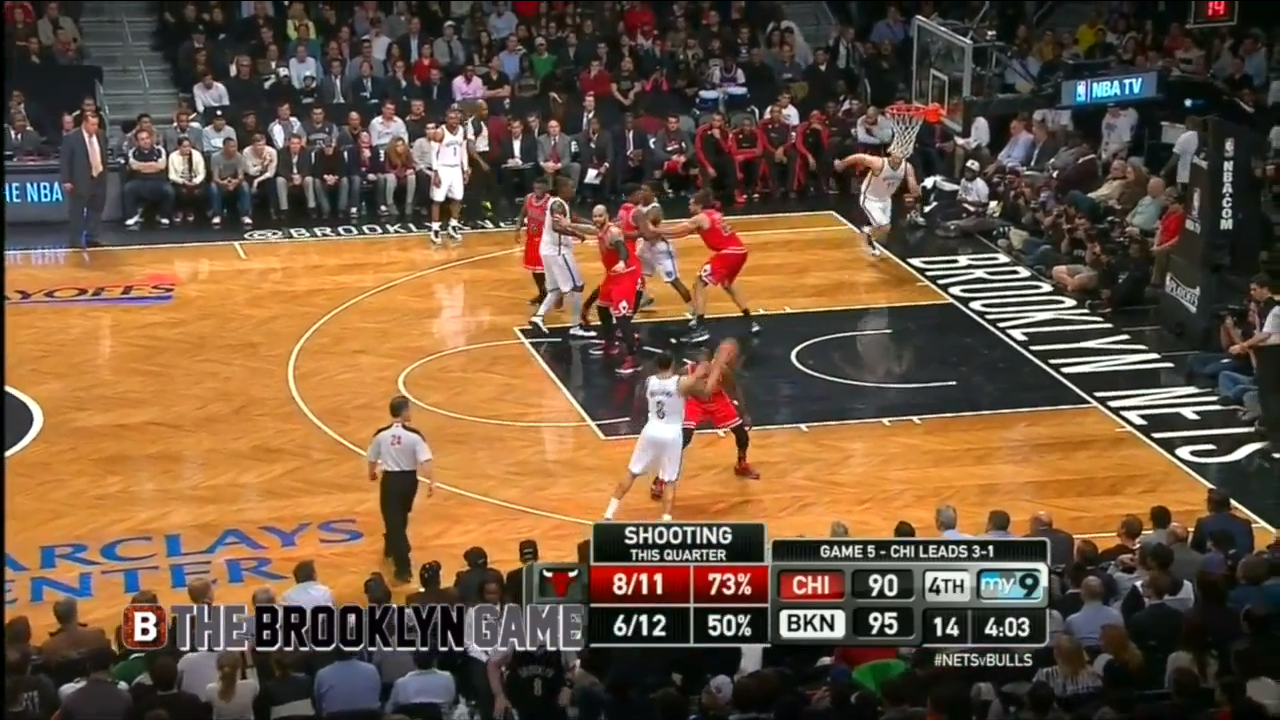
What Evans brings to the table over Blatche is historic rebounding and strong defensive acumen, one that helps buoy Lopez’s dearth on that end. But thanks to Noah’s injury and Nazr Mohammed’s perpetual mediocrity, Lopez is able to help off his man much more quickly, and the paint has been where Chicago attempts have gone to die. If Lopez is playing defense as well as he has this series, Evans’s additional defensive responsibility becomes far less important, and Blatche’s rebounding ability means the Nets can compensate for losing Evans’s primary edge.
This similarly isn’t an indictment of Evans, who has rightfully become a fan favorite at Barclays Center this year. Every team needs a player like Reggie Evans, who’s willing to play his role to perfection. But the Los Angeles Clippers best utilized him in bursts off the bench, not for 50 minutes during a triple-overtime game. Evans is a player with significant limitations that allow a vaunted-yet-limited defense like Chicago’s starting unit to load up on Brooklyn’s legitimate offensive options. With Blatche on the floor, that’s not an option.
While Lopez has an edge defensively over the plodding Blatche, they’re also interchangeable as far as defensive assignments, and the two can switch players without losing effectiveness:
In fourth quarters, the Bulls have shot just 6-23 with Lopez & Blatche on the floor, and 4-12 in the paint.
One major issue: can Blatche play that long? His calf is admittedly “very sore,” and he was struggling to stay on the floor in the fourth quarter of Game 5. Additionally, Blatche may not be well conditioned enough to play starter’s minutes; Carlesimo said that Blatche’s conditioning needed work 81 games into the season. He’s done quite well limiting him to just about 20 minutes in each of the five playoff games.
That said: according to Carlesimo, Blatche requested to stay in the game in the fourth quarter even with his calf injury, and scored 10 points on 4-6 shooting. Think about that for a second. Andray Blatche convinced his coach to let him play through pain in a crucial playoff game, and he delivered.
Imagine saying that sentence a year ago today. Then imagine saying this: in an elimination playoff game, the Nets are best giving starter’s minutes to Andray Blatche.

